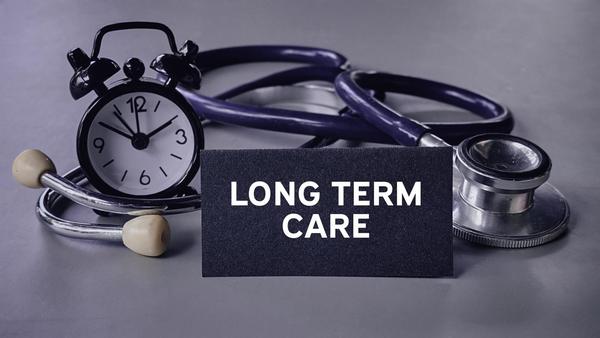What Trump’s New Bill Means for Medicaid Long-Term Care Coverage
Long-term Care Medicaid is NOT Going Away, and the Changes are Very Limited
Almost all media coverage of Trump’s newly passed OBBBA law that talks about Medicaid has focused on its doom and gloom impact on Medicaid health insurance — not Medicaid long-term care coverage, which has a
completely different set of rules. But tucked inside the bill are some potentially significant changes that directly affect Medicaid long-term care — including nursing homes, assisted living, and in-home care. Some provisions restrict eligibility. But one new provision actually creates a long-overdue opportunity! If you or a loved one is thinking about aging in place or may need long-term care down the road, these changes matter. But it's not much doom and gloom
— in fact the changes to long-term care Medicaid are relatively minor. Here’s what’s coming — and how it could affect your future.
No Direct Cuts to Long-Term Care Medicaid
It’s important to be clear right up front: Trump’s new law does not directly cut funding or eliminate coverage for nursing home care or other long-term care Medicaid services. The core benefits — including institutional care, in-home support under HCBS waivers, and personal care programs —
remain in place as before.
But while there are no outright cuts, eligibility rules are tightening, and certain protections are being eroded:
- The home equity cap will now apply more uniformly and lose its inflation protection. More on this below.
- Retroactive coverage is being shortened, making it easier to fall into uncovered gaps. More on this below.
- Citizenship verification rules are getting
stricter.
- Work requirements may divert administrative resources even if they don’t apply to the aged, blind, or disabled.
- States may hesitate to pursue new innovations due to stricter budget neutrality requirements.
In other words, the Medicaid long-term care safety net is still here — though it might possibly become harder to access and more punishing for those who don’t plan ahead. That’s why proactive asset
protection and eligibility planning is more essential than ever. The services are still available — but the window to qualify is narrowing for some people.
New Home Equity Limit: $1 Million Cap — and Why “Exempt” Doesn’t Mean “Protected”
The biggest change to long-term care Medicaid rules has to do with the change of the home equity limit. Starting January 1, 2028, a new federal cap will limit the amount of home equity you can have and still qualify for
long-term care Medicaid. The new law sets this cap at $1 million with no inflation adjustment. But what most writers don't explain, and most individuals don't understand, is that this home equity cap only matters if you’re no longer living in your home. Under both current law and the new law:
- If you’re still living in your home and receiving care under a Medicaid waiver, such as in-home personal care or adult day health care or PACE waiver, then the
value of your home is not counted at all.
- The Medicaid home equity cap only comes into play if you’ve moved out of your primary residence and into a nursing home, in which case the home is no longer your primary residence. Also, the Medicaid home equity cap only comes into play in states that temporarily exempt the home while you're still alive but living in a nursing home, under the theory that you might be able to leave the nursing home and return to
your home. Maryland and DC have this rule. Virginia does not; in Virginia, your home is only exempt (if it's under the applicable equity cap) for the first six months that you are in a nursing home. After that, your former home is a countable asset and must be sold (or protected by an experienced elder law attorney).
Right now, each state gets to choose a home equity limit from a federally defined range: In 2025, the minimum is
$713,000 and the maximum is $1,071,000, both indexed for inflation each year.
Virginia and Maryland currently use the minimum.
Washington, D.C. uses the maximum, reflecting higher property values.
The new law eliminates that flexibility and sets a nationwide cap of $1 million, with no future increases — even as housing prices
continue to rise. States will still be allowed to choose a lower cap than $1 million, but they won’t be allowed to go higher. That means:
- Virginia and Maryland residents may see increases in their cap — but not higher than $1 million.
- D.C. residents will lose over $70,000 in exempt equity immediately, and the gap will widen over time.
But here’s the most important point: even if your home is exempt for eligibility purposes, it’s not
protected from Medicaid estate recovery, and this is where many people get blindsided.
Even if you stay in your home and qualify for Medicaid-funded care — in-home or in a facility — the home will still be targeted after your death by your state’s estate recovery program. The house isn’t truly protected unless you take legal steps to protect it, which means working with an experienced elder law attorney.
If you, like most
people, plan to age in place and never enter a nursing home, keep in mind that may not be enough, because plans often change:
- Health problems may force you into assisted living, memory care, or a nursing home.
- If the home is no longer your residence, and you haven’t planned ahead, Medicaid can deny eligibility or seek repayment later.
- Even if you manage to remain at home until death, the state will come after your home to recover the cost of your
care.
In other words, under basic Medicaid rules, the home is only exempt during your lifetime; it’s not protected after death.
That’s why proactive Medicaid asset protection — especially through tools like the Living Trust Plus® — is so critical. With the right planning, you can ensure that your home remains both exempt during your lifetime and protected after your death, regardless of how your care needs evolve.
Retroactive Coverage
Shrinks under New Law - But This is a Minor Change
Currently, if someone qualifies for long-term care Medicaid, they can get coverage retroactively for up to three months prior to their application. But this rule rarely applies to elder law clients, as this retroactive rule only applies if you were actually eligible during those 3 months but for some reason waited to apply. This is almost never the case with elder law clients, because when they come to an elder law
attorney, they are not eligible; we help get them eligible by protecting assets, and then we apply right away. So if you're working with an elder law attorney to protect assets and establish Medicaid eligibility, don't expect to take advantage of any retroactive coverage. However, if you're already medically and financially eligible, then starting in 2027:
- Retroactive coverage will be limited to one month for Medicaid expansion enrollees (typically
younger adults).
- For seniors and disabled individuals under long-term care Medicaid, retroactive coverage will be reduced to two months.
Citizenship and Immigration Rules Tighten, But This Doesn't Change Anything in the DMV
As of October 1, 2026, the federal government will stop reimbursing states for Medicaid services provided to anyone who isn’t a U.S. citizen or certain qualified non-citizens (such as lawful permanent residents and
a few limited humanitarian categories). For long-term care Medicaid, this makes proper documentation even more important. Many non-citizens who have lived in the U.S. for years may no longer qualify unless they have taken specific legal steps toward permanent status. The law reinforces existing restrictions and may impact a few edge cases nationally, but does not represent a policy shift for long-term care Medicaid in Virginia, Maryland, or
D.C.
Nursing Home Staffing Rule Delayed — But Doesn't Change Anything
The Biden administration’s nursing home staffing mandate — requiring minimum levels of RNs and CNAs — is now delayed until at least 2034.
The new law imposes a nine-year moratorium on implementation, effectively putting the rule on ice.
Providers see this as necessary breathing room, while advocates worry it could worsen care conditions in understaffed
facilities.
Budget Neutrality Certification Now Required for Waivers
States often rely on Section 1115 waivers to expand or customize Medicaid — including home and community-based services. Starting in 2027, those waivers will face tighter scrutiny.
Now, the Chief Actuary of CMS must personally certify that any new 1115 waiver is budget-neutral. This could make it harder for states to innovate — especially
if new programs involve upfront spending with long-term savings.
An Unexpected Bright Spot: Assisted Living–Level Care Waivers
An unexpected bright spot in the new law is one of the most promising pieces of Medicaid legislation since Medicaid was enacted back in1965. The new law is Section 71121, which opens the door for states to create and seek approval for Medicaid waiver programs for people who need significant assistance with activities of daily living
— but don’t yet need the nursing home "level of care."
Starting July 1, 2028, states will be allowed to create waivers for individuals who meet the assisted living level of care under new community-based services waivers — even if they don’t meet the strict criteria for nursing home level care.
This is a huge positive shift.
Right now, Medicaid long-term care benefits — including in-home help —
are only available if you’re sick enough to qualify for a nursing home, meaning you need the nursing home "level of care." That threshold is often far too high for people who need real long-term care help but want to receive that help at home or in an assisted living facility instead of a nursing home.
If states take advantage of this new authority, it could dramatically expand access to:
- In-home aides
- Adult day programs
- Assisted living
services
- Preventive and supportive care that delays institutionalization
So far, no states have publicly committed to adopting this new waiver — but this is a major new opportunity for states to help elders, and for seniors, caregivers, and advocates to press state Medicaid agencies to take action before the new provision takes effect in 2028.
Final Thoughts
Trump’s new bill contains only a few changes (based on current understanding) that
tighten long-term care Medicaid eligibility and limit financial flexibility — mostly for people in high-cost housing markets or those with unpredictable care needs.
But Section 71121 is a rare and welcome innovation: a chance for states to support more people before they reach crisis point. Whether that promise is fulfilled depends entirely on what states choose to do next.
In the meantime, don’t wait. The best way to truly protect your home,
your assets, and your family is to plan ahead with the Living Trust Plus Asset Protection Trust.
Stay proactive. Stay prepared. Stay healthy.


